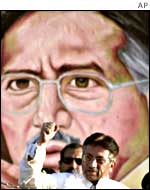|
Analysis: Musharraf and the economy
By
Louise Tillin Monday, 22 April, 2002, 16:48 GMT 17:48 UK General Pervez Musharraf says one reason he needs to stay on as president of Pakistan is to see through his economic reforms.
Dr Anwar ul Haque, of the Federation of Pakistani Chambers of Commerce and Industry, says that General Musharraf's government is the only one in Pakistan's untainted by corruption. He argues that the general has made many reforms which will require five or six years to complete. For this reason, he says, the business community in Pakistan is wholly supportive of the presidential referendum.
Musharraf's record Since assuming power in 1999, General Musharraf has pursued a programme of economic reform and debt reduction while trying to reduce poverty. Policies include:
General Musharraf has also overseen the resolution of a long running dispute between power companies which had overshadowed foreign investment. Growth slowed The International Monetary Fund (IMF) has praised the general. "Over the last two years, Pakistan has established a record of sound macroeconomic management and timely implementation of structural reforms," the IMF said last December. But economic growth slowed in 2000/01 - due in part to a severe drought.
Foreign investment has been falling, as has expenditure on social services such as health and education. And the IMF says more needs to be done on improving tax collection and poverty reduction. The Ministry of Finance in Pakistan acknowledges that poverty has risen throughout the 1990s. Last year Pakistan was in increasing danger of defaulting on its foreign debts, which in 2001 totalled 39 billion dollars - equivalent to 66.8% of Pakistan's GNP. 11 September But then came the attacks on the United States, by some accounts a watershed for Pakistan. President Musharraf quickly felt some economic benefits for supporting the US war against the Taleban the al-Qaeda movement:
The US also lifted all the sanctions it had imposed against Pakistan since 1990 for its testing of nuclear weapons. And the US Congress gave President Bush the authority to lift sanctions imposed following General Musharraf's 1999 coup. Pakistan's ostracism on the world stage came to an abrupt end. In the long run this may play well with foreign investors. War setbacks But 11 September also had significant costs for Pakistan. Investor confidence was shaken by fears of political instability due to a possible resurgence of Islamic, anti-Western extremism.
Insurance and shipping costs increased. Many exporters did not honour their contracts with producers in Pakistan. The fall in trade will have further damaged the government's tax revenues. Furthermore Pakistan has maintained a costly deployment of its troops on the border with Afghanistan to assist in the search for al-Qaeda personnel. Since December it has also seen a build up of troops on its border with India following the attack on the Indian Parliament. India blamed the attack on Pakistani-based militants fighting against Indian rule in Kashmir. Dr Ul Haque, however, says these factors can be overcome if President Musharraf is able to continue his economic reforms. He also says that the business community has had some success in recent months in moving towards new markets in Africa and Asia - mitigating, to some extent, the 11 September effect. And according to Dr Tobias Nischalke, Asia Analyst at World Markets Research Centre, despite serious concerns about democracy, Pakistan is arguably in an "unprecedented era of transformation".
|
